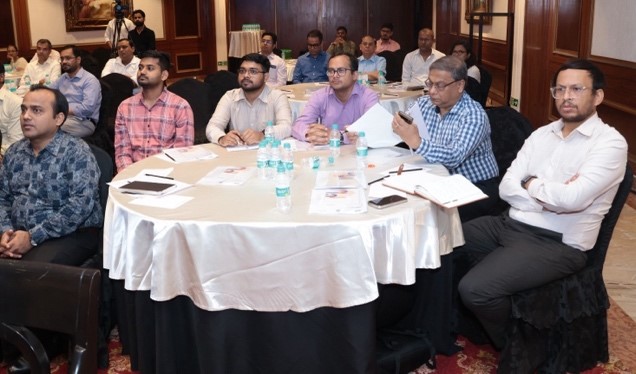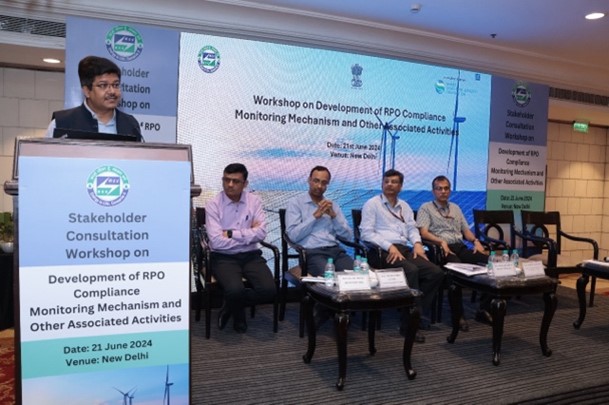 Attendees from different Think Tanks, Academia & experts from industry
Attendees from different Think Tanks, Academia & experts from industry
Background
In October 2023, the Ministry of Power under the Energy Conservation Act announced year-wise Renewable Purchase Obligations (RPOs) until 2030, commencing from 2024-25. This marks the first-ever notification of RPOs under this Act, with distinct sub-targets for wind, hydro, and distributed RE within the overarching objectives. The notification outlines the mandated minimum share of non-fossil source consumption, encompassing energy or feedstock, for designated consumers.
As per the notification, the Bureau of Energy Efficiency (BEE) is tasked with overseeing data on Renewable Purchase Obligation (RPO) compliance by designated consumers (DCs). Previously, RPO targets were monitored by respective State Electricity Regulatory Commissions. Now, with BEE being responsible for incorporating the RPO compliance mechanism, encompassing provisions for penalties & adjudication, within scope of the Energy Conservation Act, a need was felt for a dialogue with stakeholders including SERCs, on the evolving RPO processes and modalities.
In this context, BEE organised the first consultation workshop, with SERCs and other government counterparts and stakeholders on June 21, 2024, in New Delhi. Shakti Sustainable Energy Foundation was the Knowledge Partner for this event.
The workshop discussed BEE’s new RPO compliance mechanism, data management, roles of SERCs, regulatory updates, and gathering stakeholder feedback for efficient implementation.
About the Event
The event was attended by senior representatives from Ministry of Non-Conventional and Renewable Energy (MNRE), Central Electricity Authority (CEA), Grid India, Assam Electricity Regulatory Commission (AERC), Bihar Electricity Regulatory Commission (BERC), Chhattisgarh State Electricity Regulatory Commission (CSERC), Delhi Electricity Regulatory Commission (DERC), Gujarat Electricity Regulatory Commission (GERC), Kerala State Electricity Regulatory Commission (KSERC), Maharashtra Electricity Regulatory Commission (MERC), Uttar Pradesh Electricity Regulatory Commission (UPERC), West Bengal Electricity Regulatory Commission (WBERC), and experts from industry, academia and think tanks.
The inaugural session underscored India’s commitment to reducing emissions and achieving a significant shift towards non-fossil energy sources by 2030. Key pillars of this energy transition include enhancing energy efficiency and accelerating the adoption of renewable energy. Participants deliberated on the impact of multiple Renewable Purchase Obligation (RPO) regulations, stressing the need for harmonisation.
Various schemes aimed at bolstering renewable energy penetration in India, such as the PM Surya Ghar Scheme, PM Kusum Yojana, Solar Park Scheme, and Green Energy Corridor, were also briefly discussed.
 Dr Amit Kumar Singh Parihar, Director of Clean Power at Shakti, delivered a vote of
Dr Amit Kumar Singh Parihar, Director of Clean Power at Shakti, delivered a vote of
Dr Amit Kumar Singh Parihar, Director of Clean Power at Shakti, delivered the vote of thanks, highlighting RPO’s role in mitigating rising temperatures and advocating for its adoption. He stressed the importance of collaborative interventions, financing, and technological advancements to meet ambitious RPO targets set by the Ministry of Power.
In the technical session, participants engaged in discussions on ensuring adequate renewable energy resources, overcoming compliance challenges, and interpreting the latest Ministry of Power notifications on RPOs. Key topics included the institutional framework, data acquisition, compliance trends, and the crucial role of stakeholders in achieving national renewable energy goals. Challenges such as data availability and standardisation formats were identified, particularly noting the absence of actual data from several states and UTs.
The session also explored upcoming compliance mechanisms, detailing the entities involved, eligible renewable energy sources, and modes of fulfillment. Discussions on the institutional setup for RPO compliance highlighted the roles of various bodies and emphasised the flow of information crucial for compliance reporting and assessment.
During the open house discussion, participants clarified MoP notifications, discussed penalties, and deliberated on enforcement mechanisms. State commissions raised concerns about communication gaps in notifications and the imposition of penalties, stressing the importance of clarity and uniformity in RPO regulations across states.
This workshop, organised by BEE, marked the beginning of a series of workshops to refine the institutional framework for effective RPO implementation. Valuable insights and suggestions gathered during the event are expected to inform necessary changes and enhance the efficiency of the updated RPO mechanism.

